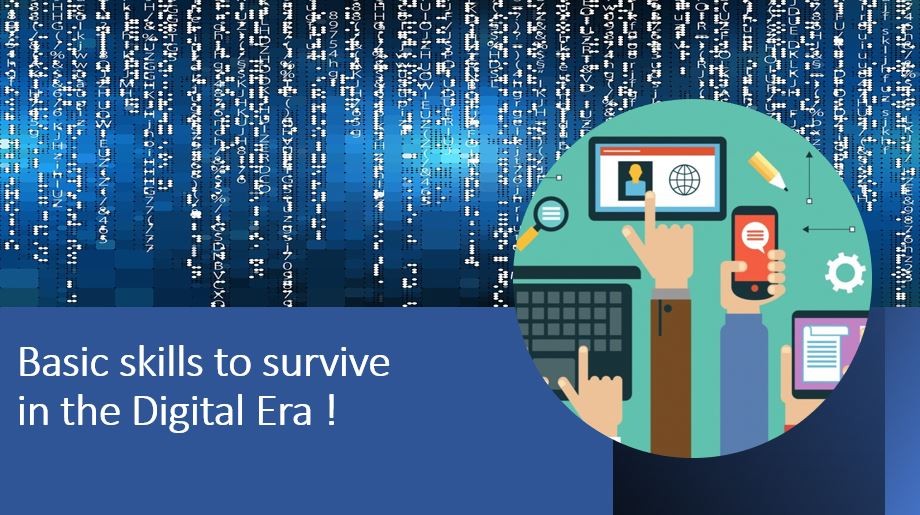We are living in an era dominated by technology and the digital world. From the way we communicate to how we work and access information, our lives have become intertwined with digital technologies. In order to thrive in this fast-paced and ever-evolving digital landscape, it is crucial to possess certain basic skills. These skills not only enable us to navigate the digital era effectively but also open up a world of opportunities for personal and professional growth. In this article, we will explore the fundamental skills necessary to survive and succeed in the digital era.
1. Digital Literacy
Digital literacy serves as the foundation for all other skills required in the digital era. It encompasses a range of abilities that enable individuals to use digital tools and technologies effectively and responsibly. Some key aspects of digital literacy include:
a. Computer Skills: Basic knowledge of operating systems, file management, and commonly used software applications is essential.
b. Internet Navigation: Understanding how to browse the internet, conduct effective searches, and evaluate the credibility of online sources is vital.
c. Information Management: With the abundance of information available, the ability to organize, store, and retrieve information efficiently is crucial.
d. Online Communication: Proficiency in email, instant messaging, video conferencing, and social media platforms is necessary for effective communication.
2. Critical Thinking and Problem-Solving
In the digital era, critical thinking and problem-solving skills play a vital role. With the vast amount of information available at our fingertips, it is essential to be able to analyze, evaluate, and make informed decisions. Additionally, technological advancements often present new challenges that require innovative problem-solving skills. Key aspects of critical thinking and problem-solving in the digital era include:
a. Analytical Skills: The ability to analyze complex problems, break them down into manageable components, and develop logical solutions is essential.
b. Creativity and Innovation: Thinking outside the box and finding innovative solutions to problems is highly valued in the digital era, where technology is constantly evolving.
c. Data Analysis: With the rise of big data, the ability to collect, interpret, and analyze data has become crucial for making informed decisions and identifying trends and patterns.
d. Adaptability and Flexibility: Being able to adapt to new technologies and navigate changing digital landscapes is essential in the digital era.
3. Cybersecurity and Privacy
As our lives become increasingly digitized, cybersecurity and privacy have become critical concerns. Basic knowledge of cybersecurity practices can help protect individuals and organizations from cyber threats and safeguard personal information. Key skills in cybersecurity and privacy include:
a. Password Management: Creating strong, unique passwords and regularly updating them is crucial to protect online accounts.
b. Phishing Awareness: Recognizing phishing emails, websites, and other social engineering attacks is essential to avoid falling victim to scams or identity theft.
c. Secure Online Behavior: Understanding safe browsing practices, avoiding suspicious downloads, and being cautious when sharing personal information online are vital for maintaining privacy and security.
d. Data Protection: Knowledge of data encryption, secure file transfer methods, and the importance of regular data backups can help prevent data loss and protect sensitive information.
4. Digital Communication and Collaboration
Effective digital communication and collaboration skills are essential in today’s interconnected world. The ability to communicate clearly, collaborate with remote teams, and build meaningful relationships online can open up new opportunities and enhance productivity. Key skills in digital communication and collaboration include:
a. Written Communication: Mastering written communication skills, including proper grammar, concise messaging, and effective email etiquette, is crucial in the digital era.
b. Virtual Collaboration: Being able to collaborate effectively through video conferencing, online project management tools, and virtual team communication platforms is vital for remote work and global collaboration.
c. Active Listening: Developing active listening skills is important in digital communication to ensure understanding and avoid misunderstandings.
d. Cross-Cultural Competence: With digital platforms connecting people from different cultures and backgrounds, having cross-cultural competence is essential for effective communication and collaboration.
5. Lifelong Learning and Adaptability
In the digital era, learning is a continuous process. The ability to adapt to new technologies, acquire new skills, and stay updated with the latest trends is crucial for survival and growth. Key skills for lifelong learning and adaptability include:
a. Curiosity and Openness to Learning: Cultivating a curious mindset and being open to new ideas and technologies are important for continuous learning.
b. Self-Directed Learning: Taking initiative in seeking out learning opportunities, whether through online courses, tutorials, or self-study, is essential for skill development.
c. Digital Research Skills: Being able to conduct effective online research, evaluate sources, and extract relevant information is crucial in the digital era.
d. Flexibility and Resilience: Embracing change, being flexible, and adapting to new technologies or work environments are vital skills for surviving in the digital era.
Conclusion
The digital era has transformed the way we live and work, making certain skills indispensable for success and survival. Digital literacy, critical thinking and problem-solving, cybersecurity and privacy, digital communication and collaboration, and lifelong learning and adaptability are key skills needed to navigate the technological landscape. By developing and honing these skills, individuals can thrive in the digital era, seize opportunities, and overcome challenges. The digital world is constantly evolving, and staying relevant requires a commitment to continuous learning and growth. Embrace these fundamental skills and embrace the possibilities of the digital era.
